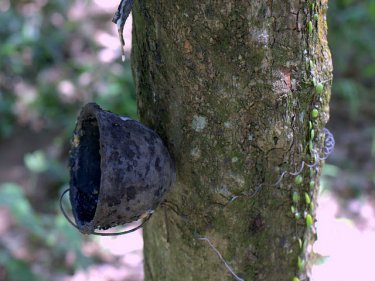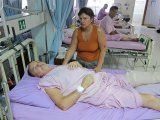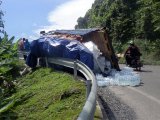PHUKET: Rubber producers may consider Phuket as a natural candidate for the home of a regional physical market to try to create a new benchmark for the commodity.
Thailand, Indonesia and Malaysia account for about 70 percent of natural-rubber output.
Bloomberg financial news agency reports today that a trade group has proposed the establishment of a physical market.
Establishment of a market would help producers trade with more transparent and reliable prices, Tjahjono Budiarto Tjandra, chairman of the Committee on Strategic Market Operations at the International Rubber Consortium Ltd., said in an interview in Bali.
Representatives from the three governments are meeting on the island to discuss stabilising prices.
Rubber has lost 33 percent on the Tokyo Commodity Exchange this year from a peak of $341 a tonne in February, with Europe's debt crisis raising concern that demand may decline.
The International Tripartite Rubber Council - which also represents growers and exporters from Thailand, Indonesia and Malaysia - last month encouraged members to blacklist buyers who default on purchases.
Establishing a physical market may involve the Indonesia Commodity & Derivatives Exchange, the Agricultural Futures Exchange of Thailand and the Malaysia Derivatives Exchange, a spokesman said.
The three exchanges and the consortium met in Phuket last month to discuss the plan.
Given its central position, direct flights, deep sea port and a long history associated with rubber, Phuket would be a suitable candidate for any physical market.
Thailand, Indonesia and Malaysia account for about 70 percent of natural-rubber output.
Bloomberg financial news agency reports today that a trade group has proposed the establishment of a physical market.
Establishment of a market would help producers trade with more transparent and reliable prices, Tjahjono Budiarto Tjandra, chairman of the Committee on Strategic Market Operations at the International Rubber Consortium Ltd., said in an interview in Bali.
Representatives from the three governments are meeting on the island to discuss stabilising prices.
Rubber has lost 33 percent on the Tokyo Commodity Exchange this year from a peak of $341 a tonne in February, with Europe's debt crisis raising concern that demand may decline.
The International Tripartite Rubber Council - which also represents growers and exporters from Thailand, Indonesia and Malaysia - last month encouraged members to blacklist buyers who default on purchases.
Establishing a physical market may involve the Indonesia Commodity & Derivatives Exchange, the Agricultural Futures Exchange of Thailand and the Malaysia Derivatives Exchange, a spokesman said.
The three exchanges and the consortium met in Phuket last month to discuss the plan.
Given its central position, direct flights, deep sea port and a long history associated with rubber, Phuket would be a suitable candidate for any physical market.










